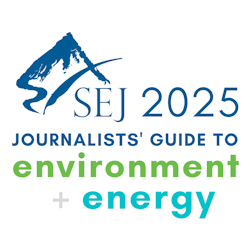SEJournal Online is the digital news magazine of the Society of Environmental Journalists. Learn more about SEJournal Online, including submission, subscription and advertising information.
 |
 |
| A busy tornado season has hit the United States this spring. Above, tornadoes in Pender, Nebraska, on June 16, 2014. Photo: Brent Koops/NOAA Weather in Focus Photo Contest 2015 via Flickr Creative Commons (CC BY 2.0). |
TipSheet: Is Your Community Ready for Tornadoes? Are You?
By Joseph A. Davis
Spring 2024 saw an unusually large number of tornadoes in the United States. In fact, as we were putting this TipSheet together, a rare outbreak (may require subscription) of tornadoes hit home here in Montgomery County, Maryland, with little warning, causing damage but no fatalities.
Public awareness of how to
improve safety can be made
better with media coverage.
Death and wreckage from these violent wind storms often make news. But with preparedness, many such fatalities and injuries can be prevented or minimized. Public awareness of how to improve safety can be made better with media coverage.
So it’s a good time for environmental journalists to be asking whether their communities are ready for the possibility of their own tornadoes. Are they?
 |
Why it matters
Environmental journalists may be among the first to ask some important but tricky questions: Do tornado swarms have anything to do with climate change? With El Niño? With other weather patterns and phenomena?
Some journalists and scientists are finding tentative answers, but this TipSheet is about much more immediate risks and questions. Like survival.
Why the readiness question matters immediately is because it saves lives. In too many of the most fatal tornadoes, people died because they were unprepared or surprised.
Story ideas
- Is your community in a “tornado alley”? It’s not really an “alley,” but statistically most tornadoes occur in certain central U.S. states, particularly the Great Plains and Midwest. Find out what the historical record of tornadoes is in your state. Any trends? Ask researchers at local universities.
- Does your community have the kind of radar coverage it needs to see tornadoes? Only specialized Doppler radar will do. A few years ago, researchers showed that there were “radar gaps” that left some communities less protected. In some areas, the gaps are worsened by terrain.
- Talk to local meteorologists (often working for TV stations) about how they get their tornado information.
- How (and how well) does the emergency notification system work in your area? Who runs it? Who cooperates? What technology platform does it use? Is it effective at warning people? Is there a big siren? Police knocking on doors? Does it work in remote areas?
- Is your community hooked into the federal Emergency Alert System? Does it have “reverse 911”? Do people know how to get alerts on their phones?
- Do people in your community have tornado-safe shelters such as storm cellars? Does everyone? Has anyone ever surveyed for this in buildings and residences? Is the terrain suitable for building new ones? Do people typically have basements?
- Does your community have trailer parks? Nursing homes? Schools and day care facilities? Big-box stores and shopping malls? Athletic stadiums? Talk to managers and residents of these especially vulnerable facilities about whether/how they are prepared to handle tornado emergencies.
- What do local building and zoning codes require regarding tornado preparedness? Are shelters required? Where and how often?
Reporting resources
- NOAA National Severe Storms Laboratory: Centered in Norman, Oklahoma, this federal agency under the National Oceanic and Atmospheric Administration is all about tornadoes.
- National Weather Service: This NOAA agency makes the basic weather predictions, which are often what local TV meteorologists rely on. Most important is the national network of local NWS Forecast Offices (see the directory here).
- NWS Storm Prediction Center: This part of the NWS predicts severe storms, including tornadoes.
- State emergency agencies: Most states have one, although names may vary. Use this directory search to find yours.
- Standard tornado-preparedness advice: There are many easy-to-use summaries of good advice for safety in tornadoes. See these from the Federal Emergency Management Agency, National Weather Service and the American Red Cross.
[Editor’s Note: For more on the subject, check out our Topic on the Beat: Disasters page, with links to numerous relevant SEJournal stories, as well as disaster headlines from EJToday.]
Joseph A. Davis is a freelance writer/editor in Washington, D.C. who has been writing about the environment since 1976. He writes SEJournal Online's TipSheet, Reporter's Toolbox and Issue Backgrounder, and curates SEJ's weekday news headlines service EJToday and @EJTodayNews. Davis also directs SEJ's Freedom of Information Project and writes the WatchDog opinion column.
* From the weekly news magazine SEJournal Online, Vol. 9, No. 24. Content from each new issue of SEJournal Online is available to the public via the SEJournal Online main page. Subscribe to the e-newsletter here. And see past issues of the SEJournal archived here.













 Advertisement
Advertisement 



